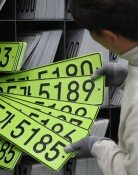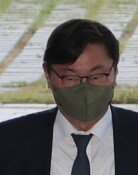Ruling party raises constitutional amendment amid ‘economic wartime’
Ruling party raises constitutional amendment amid ‘economic wartime’
Posted May. 01, 2020 08:09,
Updated May. 01, 2020 08:10
Lee In-young, the floor leader of the Democratic Party of Korea, has suggested to the United Future Party on Thursday processing the bill to allow the public to propose a bill for constitutional amendment by May 9. Lee brought up the issue of processing the one-point bill for constitutional amendment immediately following the passing of the second supplementary budget bill. A constitutional amendment bill can be currently proposed by the president or with the approval of the majority of the enrolled National Assembly members. The new bill is to allow such a proposal based on the agreement of one million people with the voting right for the National Assembly members.
The one-point constitutional amendment bill was suddenly put forth by 148 lawmakers in March when COVID-19 was heavily affecting South Korea. As there were only 295 enrolled members in the National Assembly at the time, 148 members were enough to propose the bill. Although it was mainly led by the Democratic Party of Korea, 22 members of the United Future Party, including Kim Moo-sung and Chung Jin-suk, also joined. The bill was decided to be announced on March 10 during a cabinet meeting in accordance with the rule that a constitutional amendment bill should be posted for 20 days. The posted bill should be resolved within 60 days before being scrapped. May 9 is the deadline for the new bill.
The newly proposed bill allowing a certain number of citizens to directly propose a constitutional amendment bill or a legislative bill is part of direct democracy. However, its validity has not been proved in a country setting. Such a system is only practiced in a few advanced countries, including the U.S. and Switzerland – exclusively for state constitutions, of course. The approval of one million electorates can be easily achieved mobilizing the Korean Confederation of Trade Unions and the Korean Teachers and Education Workers Union, which raises a concern that a politically biased bill for constitutional amendment can be easily proposed. Moreover, the bill lacks a process of public discussions to the degree that most people feel like the bill has been proposed abruptly.
Given the seat distribution of the 20th National Assembly, the bill is unlikely to be passed with the approval of two-thirds of the National Assembly members. However, the Democratic Party of Korea’s floor leader seems to have brought up the bill as a remaining item of the 20th National Assembly to sway some of the United Future Party members to pass the bill during the 21st National Assembly when the ruling party has more dominance. While the South Korean economy requires all-out efforts to overcome the economic crisis brought on by COVID-19, the floor leader of the ruling party is focusing on constitutional amendment, causing distraction.
Furthermore, discussions over constitutional amendment should be prioritized on revising the imperial presidential system, not on allowing the public to propose a bill for amendment. If time and energy for such a constitutional amendment are available, they should be spent on changing governance structure. However, this is not the time to spend national resources on constitutional amendment at all. The floor leader joined the argument for constitutional amendment raised by the ruling party. The ruling party must be blind to the president’s description of the current situation, “economic wartime.”
Headline News
- N. Korea launches cyberattacks on S. Korea's defense companies
- Major university hospital professors consider a day off each week
- Italy suffers from fiscal deficits from ‘Super Bonus’ scheme
- Inter Milan secures 20th Serie A title, surpassing AC Milan
- Ruling and opposition prioritize spending amid tax revenue shortfalls







